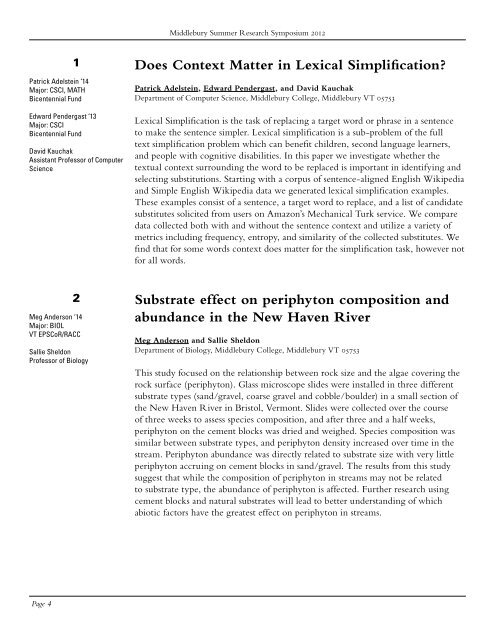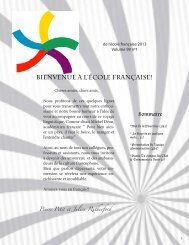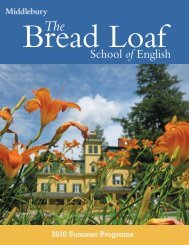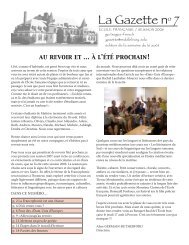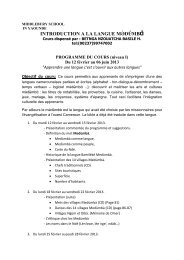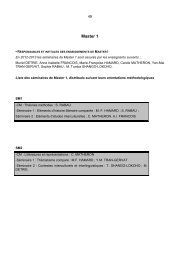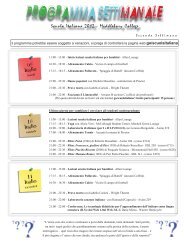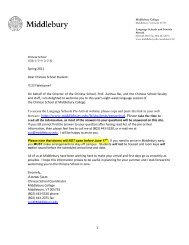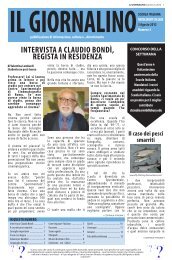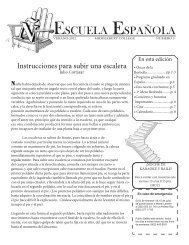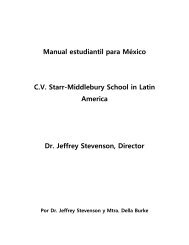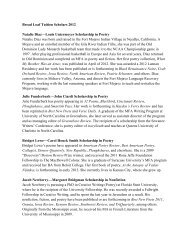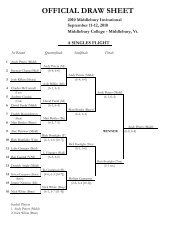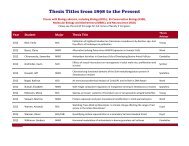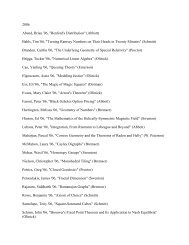2012 Summer Symposium Program - Middlebury College
2012 Summer Symposium Program - Middlebury College
2012 Summer Symposium Program - Middlebury College
Create successful ePaper yourself
Turn your PDF publications into a flip-book with our unique Google optimized e-Paper software.
Page 4<br />
1<br />
Patrick Adelstein ‘14<br />
Major: CSCI, MATH<br />
Bicentennial Fund<br />
Edward Pendergast ‘13<br />
Major: CSCI<br />
Bicentennial Fund<br />
David Kauchak<br />
Assistant Professor of Computer<br />
Science<br />
2<br />
Meg Anderson ‘14<br />
Major: BIOL<br />
VT EPSCoR/RACC<br />
Sallie Sheldon<br />
Professor of Biology<br />
<strong>Middlebury</strong> <strong>Summer</strong> Research <strong>Symposium</strong> <strong>2012</strong><br />
Does Context Matter in Lexical Simplification?<br />
Patrick Adelstein, Edward Pendergast, and David Kauchak<br />
Department of Computer Science, <strong>Middlebury</strong> <strong>College</strong>, <strong>Middlebury</strong> VT 05753<br />
Lexical Simplification is the task of replacing a target word or phrase in a sentence<br />
to make the sentence simpler. Lexical simplification is a sub-problem of the full<br />
text simplification problem which can benefit children, second language learners,<br />
and people with cognitive disabilities. In this paper we investigate whether the<br />
textual context surrounding the word to be replaced is important in identifying and<br />
selecting substitutions. Starting with a corpus of sentence-aligned English Wikipedia<br />
and Simple English Wikipedia data we generated lexical simplification examples.<br />
These examples consist of a sentence, a target word to replace, and a list of candidate<br />
substitutes solicited from users on Amazon’s Mechanical Turk service. We compare<br />
data collected both with and without the sentence context and utilize a variety of<br />
metrics including frequency, entropy, and similarity of the collected substitutes. We<br />
find that for some words context does matter for the simplification task, however not<br />
for all words.<br />
Substrate effect on periphyton composition and<br />
abundance in the New Haven River<br />
Meg Anderson and Sallie Sheldon<br />
Department of Biology, <strong>Middlebury</strong> <strong>College</strong>, <strong>Middlebury</strong> VT 05753<br />
This study focused on the relationship between rock size and the algae covering the<br />
rock surface (periphyton). Glass microscope slides were installed in three different<br />
substrate types (sand/gravel, coarse gravel and cobble/boulder) in a small section of<br />
the New Haven River in Bristol, Vermont. Slides were collected over the course<br />
of three weeks to assess species composition, and after three and a half weeks,<br />
periphyton on the cement blocks was dried and weighed. Species composition was<br />
similar between substrate types, and periphyton density increased over time in the<br />
stream. Periphyton abundance was directly related to substrate size with very little<br />
periphyton accruing on cement blocks in sand/gravel. The results from this study<br />
suggest that while the composition of periphyton in streams may not be related<br />
to substrate type, the abundance of periphyton is affected. Further research using<br />
cement blocks and natural substrates will lead to better understanding of which<br />
abiotic factors have the greatest effect on periphyton in streams.


